- Home
- Fern Michaels
A Season to Celebrate Page 20
A Season to Celebrate Read online
Page 20
Moira smiled, but there was a flicker of something else entirely that passed through her eyes. She turned her attention back to her food before he could figure out whether it was disappointment or resignation.
“What made you decide to become a chef?” she asked, somewhat obviously changing the topic. “Other than your ridiculous, God-given talent for making everything taste out of this world, I mean,” she said, smiling as she popped another bite into her mouth.
“Oh, that was pretty much it,” he said, wondering if she’d always make him grin like a madman, hoping he got the chance to find out.
She laughed at that, then took a moment to enjoy another bite. Then another. She finally put her fork down, dabbed her mouth with her napkin, and let out a contented sigh. “Well, I think I can speak on behalf of the entire planet when I say thank goodness you figured that out and went with it.”
He dipped his chin in a nod at the compliment. “What got you into law? I know from Seth that you’re the only lawyer in the family.” He smiled. “Did you discover you have a God-given talent for adjudicating?”
Despite the earlier flicker, she smiled good-naturedly. “With five older siblings, it’s a handy skill to have.”
“So, it is your superpower then. Good, that will come in handy at my hearing.”
She frowned then. “What hearing?”
“The one happening the morning after tomorrow, down at the courthouse in Turtle Springs.” He nodded at the plate again. “Go on and finish. We can talk about it later.”
She laid her napkin on the table, all vestiges of sleep-of-the-dead hangover gone. Her gorgeous green eyes were clear, sharp, and focused now. On his legal predicament, anyway. He wondered what it would take to get her to be interested in the rest of him like that. “Assault and battery. Right. Sorry. Who charged you? The county?”
He shook his head. “Maxwell Taggert’s attorney.”
“Maxwell—” She broke off as her eyes went wide. “That sleazy pervert who hit on me? That Max was—is—Maxwell Taggert? The king of the tabloid? What was he doing in Turtle—” She broke off with a wave of her hand. “Never mind. Silly question. I guess given his ego, he thought he might directly crash the wedding. So, his interest in me wasn’t just because he’s a creepster. He probably was looking for any way to get a story for his paper.”
Hudson saw her visibly shudder. She rubbed her arms and winced, then looked down and noted the purple marks on her bicep and forearm.
He slid from his side of the table and crouched next to her. “Here, let me take a look.”
“It’s okay,” she said, but he gently took her arm and she shifted so he could turn it and see the bruising. “We should probably take pictures of those.”
“The bruises?” he asked her, surprised.
“Evidence for your case.”
“Ah, right. Let me get you a pain reliever, and some ice. You’ve a bit of swelling there.”
His fingers were gently stroking the soft skin near but not on the bruised area when her gaze met his, and held. They were mere inches apart, and he got all caught up in the emerald green of her eyes.
“I’m not feeling any pain,” she said, somewhat faintly, as they continued to look at one another.
“Good,” he said, but their gazes held for another long moment.
Had it been any other time or situation, he’d have leaned in for a kiss. He was dying to taste her, to connect with her in a far more direct way. But there was that whole manhandling thing and he knew she’d likely had more than enough direct contact with the opposite sex in the past twenty-four hours to last her a good long while.
So, he eased back and stood. “I’ll make a cool compress then,” he said. Anything to keep his hands busy, and off her. “With or without the photos, I’m thinking we can make a pretty good case that he was asking for it,” Hudson said.
“I think he’ll have a team of very, and I mean very high-priced attorneys here by tomorrow morning, if he doesn’t already.” She looked at him straight on, her expression as serious as he’d seen it yet. “You need to get an attorney. A very, very good one.”
He flashed her a smile as he folded up a dish towel and ran it under cold water, then wrung out the excess. “Lucky I already have one of those.”
“Oh, good,” she said, relieved. Then she looked at his smile and her eyebrows lifted. “You mean me? No. First of all, I don’t have a license to practice law in Virginia. Secondly, even if I got the judge to allow it in this instance, you need someone a whole lot more experienced than me on this. Not to mention someone familiar with the laws in this state. I could make some calls, get a few names. If you can’t afford—”
“It’s not about what I can afford,” Hudson told her. “It’s about that I’m not in the wrong here. Maxwell Taggert can file all the lawsuits against me he wants, but he won’t win them.”
Moira shook her head. “He doesn’t need to win them. In fact, he never even has to go to trial to get what he wants.”
“What, some sort of plea deal? Moira, he has no case. I’m sure if we explain to his attorneys the things he said to you, they’ll be begging me not to file my own lawsuit. Or you not to file one.” He walked over and carefully wrapped the towel around her bruised bicep.
She placed her hand on it to keep it in place, then met his gaze. “Thank you,” she told him. “That does feel better.”
He nodded. “Good. Let me know if you change your mind about the pain reliever.” Seeing the marks on her arm filled him with the same uncustomary anger he’d experienced last night when he’d watched it happening right in front of him. Growing up as he had, he wasn’t a stranger to using his fists to solve things when it was demanded of him, but those times were well in his past. It was his nature to resolve issues with words, not fists. He was pretty easygoing, all told. But seeing those bruises made him feel anything but pacifistic. Probably not a good mind-set to have when you’re standing accused of assault, he thought, no matter how much provoked.
Moira waited for him to sit down across from her again before continuing. “Taggert’s not looking to make a deal, or even to send you to jail. That’s not what men like Taggert do. Don’t you remember what he said to you? He said he’d ruin your life. Unless you have a fortune stashed away somewhere—and it better be a really, really big one—he can do that without ever setting foot in court. Or back in the state of Virginia for that matter. He’ll simply have his attorneys tie this thing up six ways to Sunday for months on end until he bankrupts you by drowning you in your own legal fees trying to keep up with them.”
Hudson hadn’t thought of it like that. “I didn’t do anything wrong. He started it. I know that sounds like a grade school response, but it’s the truth. I merely finished it to protect you. And it’s neither of our faults that the rest of the bar got involved. I’m not responsible for that.”
“And, again, none of that matters. He’s not trying to beat you in court. He’s going to beat you by draining your bank account dry.”
“Well, then, he’ll be disappointed. I’ve worked from nothing and for nothing, more often in my life than not. I mean, I do quite well for myself, but I don’t measure success in dollars. He can take what I have. I’ll just go on and earn it back. It’s just money.”
Hudson would like to think Taggert would have better things to do than target some unknown chef in a little mountain town. But he’d looked the man in the eye. Guys like Taggert did not like to lose. Most especially to someone they felt was beneath them. He suspected Moira was right. Sighing, he added, “So, if that is his strategy, can we simply refuse to play? I mean, let him file whatever he wants to file. What if we simply don’t respond? Worst case is our lack of response will force it into a courtroom, where he will lose, or get it thrown out, right? We’re not the ones trying to win anything.”
“It doesn’t always work that way. Your attorney can be compelled to respond. Listen, Hudson, there are a million ways this guy can get you. A frivolous lawsuit
is merely one of them. Certainly, the easiest one for him, as it doesn’t require him to do anything.”
Hudson leaned back in his chair, all thoughts of enjoying a late morning breakfast with an adorably disheveled maid of honor forcibly replaced by the dawning of a new reality he had no desire to embrace. “So, what’s the worst case then? What if I refuse to hire an attorney, represent myself. Just saying,” he added when she immediately began to shake her head. “My point being, if he’s trying to bankrupt me and I represent myself, then I’m out nothing. Except sound legal advice, I know. What I’m asking is, if I remove that outcome from the table, then what does he do to counter me? They can’t penalize me without some kind of trial, and if we get into a courtroom, it’s over—he loses.”
“I’ll be honest and say I don’t know what other options he might be willing to exercise. I don’t know the laws in this state. Even if this was happening in my own home state where I am licensed to practice law, I’d be recommending you find someone who carries much bigger guns than I do.” She smiled at that. “And given I’ve only been practicing a little over a year, that would be pretty much everybody.”
“But you are a trial attorney,” he said.
She lifted her eyebrows. “Does Seth really talk about me that much?”
Hudson lifted a shoulder, and his smile returned. “He’s proud of you. With good reason.” He saw that flicker again, and this time he didn’t let it pass. “Is there something else going on?”
“Why do you ask that?”
Her expression had become immediately guarded, which told him he’d hit the nail right on the head.
“The few times I’ve said something flattering about you in regard to your occupation, let’s just say you’ve looked a little . . . conflicted? Maybe that’s not the right word. Is it that now you’re in the job, you’ve come to realize it’s not for you? Because now that I’ve met and fed every person in your immediate family, I think I can safely say they’d support you no matter what.”
She shook her head. “It’s not that. I love my job. Is it possible to know you want to be a lawyer right from childhood? That would describe me.” She found a smile then. “Other kids were outside playing and I was watching Law & Order marathons, imagining how I’d do my closing statement.”
Hudson laughed. “I completely understand that remark, only with me it was The French Chef with Julia Child. ” Moira let out a short laugh at that, and he said, “She was like the crazy aunt I always wanted and never had.”
Moira studied him for a moment, as if wanting to say something, but judiciously holding her tongue.
“What?” he asked easily, liking that she wanted to know more about him. He wanted to know everything about her.
“In the bar last night, you told Max you didn’t have a mom.” She lifted her hand. “It’s none of my business, and if you don’t want to talk about it, please don’t. It’s just, you said something about helping your sisters earlier and so I was curious.” Her smile came naturally this time, and made her green eyes dance. “Being an inveterate snoop is also a key attribute of a born defense attorney.”
“I thought that was reserved for journalists and detectives.”
“Them too. But we all need to get at the truth.” Her smile turned a shade dry. “Just for different reasons.”
He smiled in response. “I don’t mind. It’s not a sensitive subject, or I wouldn’t have offered it up to the likes of Taggert. I’m not embarrassed or proud of the fact. I didn’t have any say in the matter. It’s simply my story.”
“That’s a good way to look at it.”
He shrugged. “The only way, as I see it. Wanting it to be different won’t change it. Best to just own it.”
She plucked another strawberry from her plate. “So, what is the story of Hudson Walker?” She bit into the strawberry and his pulse leapt. Not because she’d done so in any particularly vampish manner. Far from. She looked a fair fright and she ate like a woman starved. Both of those things were insanely attractive to him. A woman who wasn’t freaked out by looking less than her best and didn’t enter every calorie she consumed into some dieting phone app? Where did he sign up?
He relaxed back in his seat now, but not before picking up the strawberries from his own plate and popping one, then the other in his mouth. She made him hungry. Starved, in fact. But given the events that had led them to this morning breakfast together, the last thing he could do right now was come on to her, no matter how sincerely and respectfully. So, instead, he gave her the part of him he could, and perhaps that was the more important part to share first, anyway. “I’m just a poor orphan boy,” he told her, smiling as he said it. “I was raised in a convent orphanage in Queensland by a group of nuns.”
Moira burst out laughing, then immediately clapped her hand over her mouth. “Oh my gosh, that was so rude,” she said. “I’m so sorry. I just . . . You said earlier about having experience helping your sisters with their clothes—”
Hudson busted out a laugh at that. “Ah, no, I wasn’t referring to the nuns.”
Their gazes caught, and Moira giggled, which turned into a snicker, that might have included a short snort, which sent Hudson off laughing again, and the two of them ended up laughing until they were left gasping for breath.
“I really . . . am . . . sorry,” Moira said, still struggling to breathe evenly. “So wrong of me.” She sipped her now cool coffee, trying to get her voice back, and he drank the rest of his orange juice, trying to do the same. “So,” she said at length, attempting a sober tone, “how many sisters did you have?”
“Twenty-four,” he replied, every bit as soberly, then smiled at her stunned reaction. “That’s how many girls were in the mission with me. I was the oldest, and the only boy. The orphanage was for girls. I was left on their doorstep when I was two. There was no place for me to go, so I stayed on with them until they could find me a place, either in another mission or with a foster family.”
“And they never did?” Her expression softened.
“It’s okay,” he told her. “I was like their big brother and, well . . . I liked it. I mean, I went to school, I had plenty of mates, some of whom I still consider to be good friends. But at the end of each day, I went home to a place where I was looked up to, I was needed, I was important. And I was good with that.”
“How old were you when you left? Or did you stay on? Is that where you learned to cook? When did you come to the States?”
Hudson laughed. She was so serious, so concerned, so wanting to get to the bottom of it, of him. And he was very okay with that. “I was seventeen when the mission closed. I had graduated school and it was ruled that I be considered emancipated. My first job at age fourteen was flipping burgers in a take-out place owned by a retired couple.”
“Fourteen?”
“Minimum age for employment was thirteen. And granted, I shouldn’t have been anywhere near a hot griddle, but I looked older than I was, and I could be a bit of a charmer when I put my mind to it.”
She laughed. “I’m not having a hard time at all believing that.”
“Why, thank you,” he said, with a wink. “I’ll keep that in mind.” She didn’t blush, but neither did she say anything to negate his first openly flirtatious comment, and he tucked that information away, too, and went on. “I started experimenting with their very limited menu on my own time.” He grinned. “Eventually the owners caught on and put a stop to that, but I’d done a little experimenting in the kitchens at the mission, too. Mostly it was out of desperation for better tasting food.” He smiled. “Or food that had any taste at all. They didn’t have any cookbooks, so I really was flying blind. That’s when I discovered my patron saint, Julia Child.”
Moira grinned at that. “And then you went on to take over that burger joint, right?” she said, only half teasingly.
He shook his head. “I decided that my life had been untraditional enough, so when I finished my senior secondary years—your junior and senior high sc
hool years here, I believe—I went off and applied to a cooking school. Not the best of the best, but one I could afford, or at least work my way through. Which I did.” He smiled. “There I learned that I wasn’t so much drawn to fancy French cooking, or fancy anything. I just wanted to make food we all enjoy taste better.”
“And you thought we Americans would be the best test subjects?”
He laughed, shook his head. “I became something of a vagabond. Traveled the world, worked long enough in one place to learn what I could about the cuisine, or the parts that interested me, anyway, then took off for another place. Wherever I could afford to get to on whatever I’d saved up. I’d been to the States a few times before this go.”
“This . . . go? So, you’re just temporary here?” She looked around the renovated train car. “A lot of trouble to go to for a short-term stay, isn’t it? I mean, you can’t be much older than me. A few years maybe? So I’m assuming you don’t stay all that long in one place.” She looked back at him. “How long have you been here?”
“Christmas Eve was my one-year anniversary, actually.” His smile widened at her surprise. “I was first hired on as a chef at the little inn in town. Fought my way through a pretty gnarly snowstorm to start that job, in fact. Ended up swapping spots with a man who’d applied to work for Sawyer—your brother’s friend who—”
“Owns the microbrewery and part of the mill,” she finished for him with a smile. “Yes, I know who Sawyer Hartwell is. He and my brother served in the military together before Seth came here.” She contemplated the berries on her plate, but kept her hand on the cool compress and looked back at him. “So, you swapped spots with the cook Sawyer hired?”

 Safe and Sound
Safe and Sound Santa Cruise
Santa Cruise Deep Harbor
Deep Harbor Truth and Justice
Truth and Justice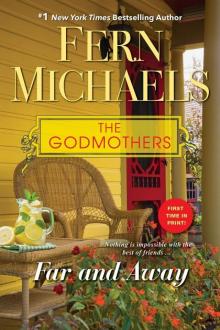 Far and Away
Far and Away The Christmas Stocking
The Christmas Stocking 18. Cross Roads
18. Cross Roads Texas Sunrise
Texas Sunrise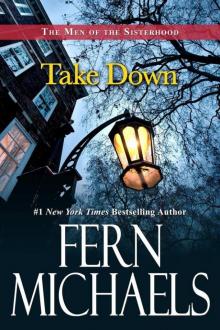 Take Down (The Men of the Sisterhood)
Take Down (The Men of the Sisterhood) Sleigh Bells
Sleigh Bells A Golden Tree
A Golden Tree About Face
About Face To Taste The Wine
To Taste The Wine Texas Rich
Texas Rich 15. Vanishing Act
15. Vanishing Act To Have and to Hold
To Have and to Hold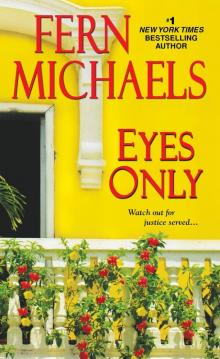 Eyes Only
Eyes Only Fearless
Fearless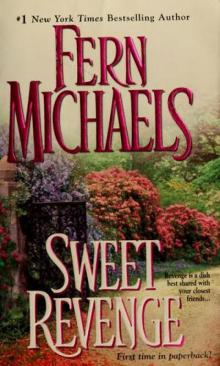 5. Sweet Revenge
5. Sweet Revenge A Season to Celebrate
A Season to Celebrate Cut and Run
Cut and Run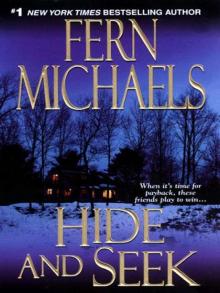 8. Hide and Seek
8. Hide and Seek A Snowy Little Christmas
A Snowy Little Christmas Hidden
Hidden Sins of the Flesh
Sins of the Flesh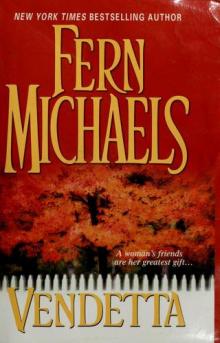 3. Vendetta
3. Vendetta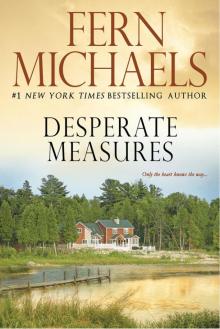 Desperate Measures
Desperate Measures No Way Out
No Way Out Late Edition
Late Edition 11. Collateral Damage
11. Collateral Damage Texas Heat
Texas Heat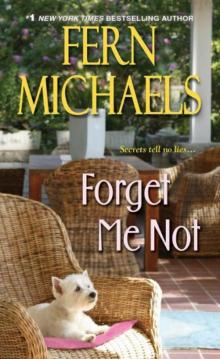 Forget Me Not
Forget Me Not 4. The Jury
4. The Jury 16. Deadly Deals
16. Deadly Deals Plain Jane
Plain Jane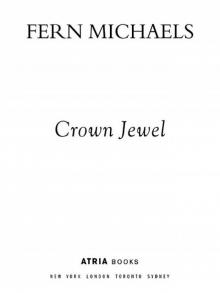 Crown Jewel
Crown Jewel Sweet Vengeance
Sweet Vengeance 19. Deja Vu
19. Deja Vu Point Blank
Point Blank Truth or Dare
Truth or Dare Family Blessings (Cisco Family)
Family Blessings (Cisco Family)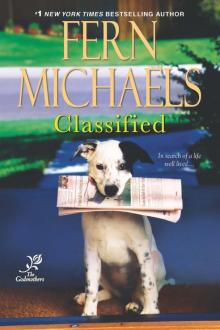 Classified
Classified The Blossom Sisters
The Blossom Sisters Spirited Away
Spirited Away Wishes for Christmas
Wishes for Christmas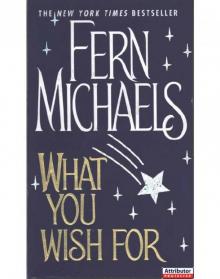 What You Wish For
What You Wish For Fancy Dancer
Fancy Dancer 14. Razor Sharp
14. Razor Sharp I'll Be Home for Christmas
I'll Be Home for Christmas Vegas Sunrise
Vegas Sunrise Trading Places
Trading Places Charming Lily
Charming Lily Cross Roads
Cross Roads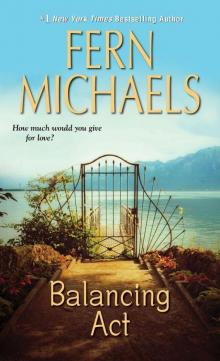 Balancing Act
Balancing Act Cinders to Satin
Cinders to Satin A Family Affair
A Family Affair A Winter Wonderland
A Winter Wonderland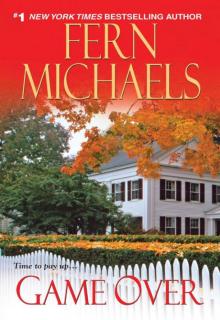 17. Game Over
17. Game Over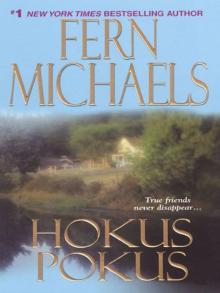 Hokus Pokus (The Sisterhood: Rules of the Game, Book 2)
Hokus Pokus (The Sisterhood: Rules of the Game, Book 2)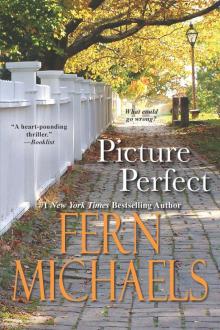 Picture Perfect
Picture Perfect Dear Emily
Dear Emily 9. Hokus Pokus
9. Hokus Pokus Cross Roads - Sisterhood book 18
Cross Roads - Sisterhood book 18 Blindsided
Blindsided Fast Track
Fast Track Hey, Good Looking
Hey, Good Looking Kentucky Heat
Kentucky Heat Yesterday
Yesterday Weekend Warriors
Weekend Warriors Coming Home for Christmas
Coming Home for Christmas Vanishing Act
Vanishing Act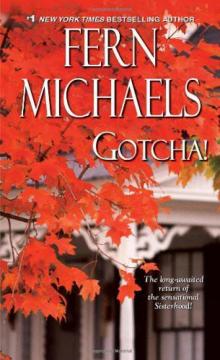 Gotcha!
Gotcha! Home Free
Home Free Fast Track (The Sisterhood: Rules of the Game, Book 3)
Fast Track (The Sisterhood: Rules of the Game, Book 3) Holly and Ivy
Holly and Ivy Fool Me Once
Fool Me Once The Most Wonderful Time
The Most Wonderful Time Exclusive
Exclusive Jingle All the Way
Jingle All the Way Vendetta
Vendetta Kentucky Rich
Kentucky Rich Lethal Justice
Lethal Justice The Future Scrolls
The Future Scrolls Deja Vu
Deja Vu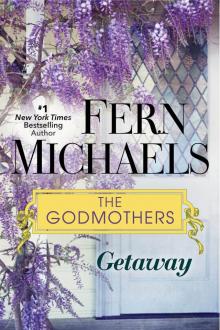 Getaway
Getaway Mistletoe Magic
Mistletoe Magic Seasons of Her Life
Seasons of Her Life When the Snow Falls
When the Snow Falls Breaking News
Breaking News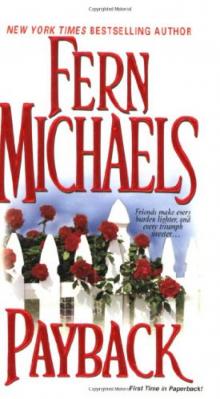 2. Payback
2. Payback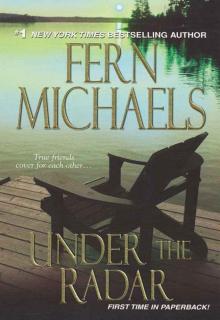 Under the Radar
Under the Radar Serendipity
Serendipity High Stakes
High Stakes Need to Know
Need to Know Captive Innocence
Captive Innocence Countdown
Countdown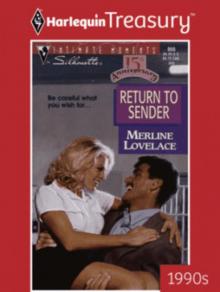 Return to Sender
Return to Sender Fast and Loose
Fast and Loose Sara's Song
Sara's Song Razor Sharp
Razor Sharp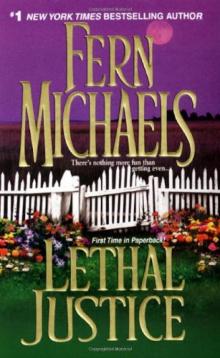 6. Lethal Justice
6. Lethal Justice Hokus Pokus
Hokus Pokus 13. Under the Radar
13. Under the Radar 7. Free Fall
7. Free Fall Collateral Damage
Collateral Damage Whitefire
Whitefire Upside Down
Upside Down Southern Comfort
Southern Comfort Celebration
Celebration 1. Weekend Warriors
1. Weekend Warriors 10. Fast Track
10. Fast Track Making Spirits Bright
Making Spirits Bright Silver Bells
Silver Bells Holiday Magic
Holiday Magic Christmas At Timberwoods
Christmas At Timberwoods Captive Embraces
Captive Embraces Winter Wishes
Winter Wishes Listen To Your Heart
Listen To Your Heart Kentucky Sunrise
Kentucky Sunrise Tuesday's Child
Tuesday's Child Final Justice
Final Justice Free Fall
Free Fall No Safe Secret
No Safe Secret Deadly Deals
Deadly Deals Wish List
Wish List Pretty Woman
Pretty Woman Payback
Payback Mr. And Miss Anonymous
Mr. And Miss Anonymous The Scoop
The Scoop In Plain Sight
In Plain Sight The Nosy Neighbor
The Nosy Neighbor Final Justice: Sisterhood Series #5
Final Justice: Sisterhood Series #5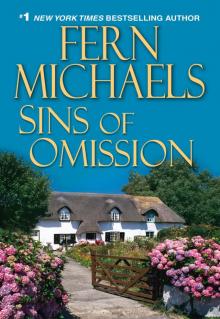 Sins of Omission
Sins of Omission The Jury
The Jury Captive Secrets
Captive Secrets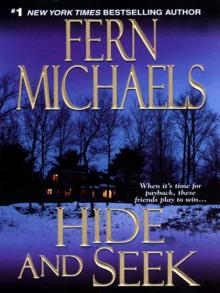 Hide and Seek (The Sisterhood: Rules of the Game, Book 1)
Hide and Seek (The Sisterhood: Rules of the Game, Book 1) Crash And Burn
Crash And Burn Sweet Revenge
Sweet Revenge Secret Santa
Secret Santa 20. Home Free
20. Home Free Game Over
Game Over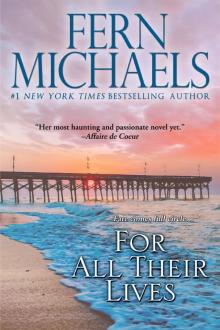 For All Their Lives
For All Their Lives 12. Final Justice
12. Final Justice Hideaway
Hideaway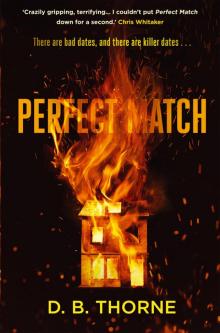 Perfect Match
Perfect Match